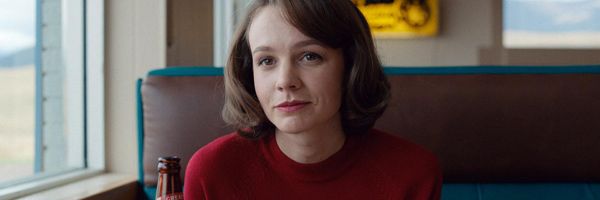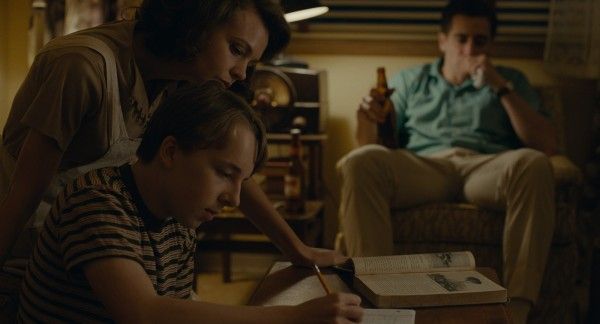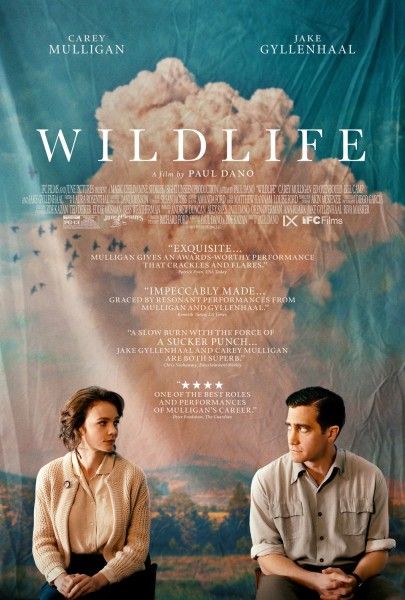This is a re-post of our Wildlife review from the 2018 Sundance Film Festival. The film is now playing in limited release.
Wildlife is a film about faces. The face of a young boy, confused and inquisitive, attempting to untangle the mystery behind his parents’ quiet conversations. The face of a mother, resilient yet fragile, attempting to put on a façade of optimism when surrounded by impending destruction. The face of a father, embarrassed and defeated, trying to maintain a shred of dignity as he loses his job. That Paul Dano chose the Richard Ford novel Wildlife as his directorial debut was a feat of ambition, but in practice—working from a meticulous and introspective script he co-wrote with Zoe Kazan—the film is a more than promising debut, chronicling a crumbling family life in 1960 Montana with restraint, intimacy, and great care for some terrific performances.
Wildlife is told from the point of view of a 14-year-old boy named Joe (Ed Oxenbould). Quiet but smart, Joe seemingly lives an idyllic life with his loving parents Jerry (Jake Gyllenhaal) and Jeanette (Carey Mulligan). But when his dad gets fired from his job at the golf club and spirals into a pit of alcoholism and depression (which he dutifully attempts to hide), a strain is put on the relationship with Joe's strong, intelligent, and resilient mother that perhaps was always bubbling under the surface. Things go further south when Jerry decides his best option is to go off and join the other men who can’t find work and fight forest fires, a dangerous occupation that pays very little. This leaves Joe and Jeanette to fend for themselves, and while Jeanette finds a job at the local YMCA teaching swimming, she begins to question her entire place in life while also attempting to put on a happy face for Joe, who grows increasingly concerned with his mother’s seemingly erratic behavior.
What follows is a quiet, deliberately paced family drama, which could have resulted in a bore of a film but instead, thanks to the layered screenplay by Dano and Kazan and assured direction, results in a compelling, literary-like character study. Carey Mulligan delivers quite possibly the best performance of her career with Jeanette, a 34-year-old woman who was/is more than capable of holding a job, but whose place in life was dictated both by her gender and traditional parenting roles, as she got pregnant with Joe when she was just 20 years old.
Mulligan delivers a dynamic performance that doesn’t betray the truth of Jeanette and her situation. She’s a woman who’s been left alone with her child with little source of income, and it’s up to her to literally hold this “family” together, if she even wants to have this family at all. This results in some concerning behavior in the eyes of Joe, who begins to see his mother in a new light—as a 34-year-old woman, not just a matriarch. Jeanette tries her hardest to keep the façade up, but it cracks in places. This is played beautifully by Mulligan, and I swear the actress can tell a thousand stories with just a single look on her face. Gyllenhaal too is unsurprisingly excellent, as is Bill Camp in a key supporting role, and Oxenbould proves himself a talented young performer. But this movie rightfully belongs to Mulligan, and she knocks it out of the park.
I mentioned faces. Dano’s framing, working with cinematographer Diego Garcia, is exquisite, evoking the meticulous work of Roger Deakins. Dano gives us plenty of time to examine the faces of these characters, and that results in rich and deep connection with each and every one. Moreover, he often opts to let scenes play out while keeping the camera on a key listener in the conversation, most frequently Joe, which underlines the point of view from which we’re experiencing these events. It puts us in the shoes of a 14-year-old whose entire life is crumbling before his eyes, even if he doesn’t completely understand exactly what’s happening. It’s a bold decision on Dano’s part, but it pays off as a powerful piece of filmmaking—indeed, if there was any doubt that Dano is a director at heart, Wildlife should put that to rest. It’s a beautifully crafted film.
Wildlife does suffer from some pacing issues in its middle section, and some folks may not find the conclusion very satisfying. Regardless, the drama ultimately results in a rich and thought-provoking viewing experience, especially as it relates to Jeanette and how the film chronicles the experience of being a young mother in 1960.
Comparisons to films like Revolutionary Road will no doubt be made (perhaps subconsciously as a result of Deakins' cinematography in that family drama), but Wildlife very much stands on its own as a rewarding, gorgeous, and introspective piece of work. Dano and Kazan go deep into the lives of each of these characters, taking the time to fill them out with complexity and mystery, refusing to give the audience all the answers.
It’s a film that provokes discussion—about family, about gender roles, about the interior lives people lead. We like to think of our parents as untouchable sources of confidence and comfort, but they’re individuals just like us, with their own passions, desires, and faults. Wildlife digs into the complexity of these dynamics, buoyed by a powerhouse performance from Carey Mulligan. And along the way it announces Paul Dano as a bona fide filmmaker in his own right.
Rating: B+



